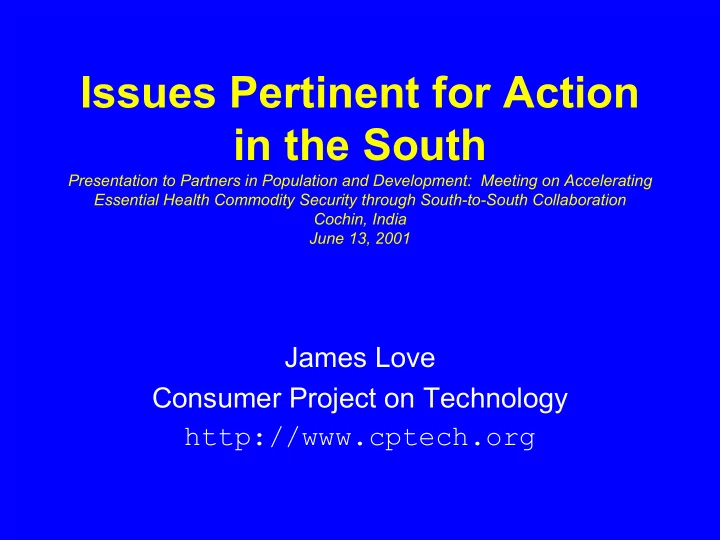

Issues Pertinent for Action in the South Presentation to Partners in Population and Development: Meeting on Accelerating Essential Health Commodity Security through South-to-South Collaboration Cochin, India June 13, 2001 James Love Consumer Project on Technology http://www.cptech.org
Intellectual Property Rights and Health • Patents on medicines • Trademarks – generic drug substitution – Regulation of cigarette advertising • Sui generis regimes – Rights in data – Protection of generic resources, traditional medicines, etc
Debates over IPR and trade policy have changed minds • Among the key events: – The 1998 debate over the World Health Assembly’s “Revised Drug Strategy.” – Activist campaigns against trade pressures against developing countries. – The visual images from the recent trial over the South Africa Medicines Act.
What are the costs of the patent system? • Exclusive rights lead to high prices • Patent system is very expensive to administer • USA spends $1 billion annually to run its patent office and million more to litigate patent disputes • Many countries do not have the capacity to evaluate patent claims, or to litigate bad patents • Increasingly complex intellectual property rights • Claims can inhibit research and commercial development of new products
Fluconazole Price in Thailand – 1998 to 1999 In Thai Baht 200 200 150 100 50 6.5 0 Exclusive Marketing Rights Competition
Impact of Brazil purchases of generic 3TC on competitive prices for raw materials $10,000 $10,000 $8,000 $6,000 $4,000 $2,000 $700 $0 1999 2001
What is compulsory licensing? • When the government or a judge issues a non-voluntary license to use a patent.
Why is compulsory licensing important? • Compulsory licensing can introduce competition and lower prices. • Compulsory licensing can prevent a patent holder from blocking R&D and/or the development of new products.
Areas of confusion regarding compulsory licensing • Compulsory licensing is not restricted to cases of national emergencies. • Compulsory licenses are not limited to local production. – Medicines can be imported. – Medicines can be exported.
Recent compulsory licensing cases – US • Exxon/Unocal clean fuel patent • Gemstar patents on interactive television. • Miller Industries tow truck patents • Anderson Gene Patent • Monsanto license for Holden's corn germplasm – Europe/Germany • IMS database – Brazil • Efavirenz (Sustiva/Stocrin) – South Africa • Several HIV drugs
The WTO/TRIPS permits different national approaches • TRIPS is a framework, not a law. Article 1 says: – "Members shall be free to determine the appropriate method of implementing the provisions of this Agreement within their own legal system and practice.“ • There is flexibility, but with few exceptions, developing countries have not embraced good models for compliance, relying too much on models taken from European and US laws.
Models for good state practice • Avoid overly legalistic approaches – Use administrative procedures for decisions. – Publish Royalty Guidelines – Limit rights of patent owners to seek injunctive relief (TRIPS Article 44.2). • Liberal government use provisions. • Permit exports of medicines. • Bolar and research exceptions. • Patent exception for Compassionate Use
Reviews of decisions may be by Administrative process • 31(i) the legal validity of any decision relating to the authorization of such use shall be subject to judicial review or other independent review by a distinct higher authority in that Member; • 31(j) any decision relating to the remuneration provided in respect of such use shall be subject to judicial review or other independent review by a distinct higher authority in that Member;
Remedies for use by third parties authorized by a government may be limited to compensation Article 44.2 Notwithstanding the other provisions of this Part and provided that the provisions of Part II specifically addressing use by governments, or by third parties authorized by a government, without the authorization of the right holder are complied with, Members may limit the remedies available against such use to payment of remuneration in accordance with subparagraph (h) of Article 31. In other cases, the remedies under this Part shall apply or, where these remedies are inconsistent with a Member's law, declaratory judgments and adequate compensation shall be available.
Standards for compensation • Article 31(h) – the right holder shall be paid adequate remuneration in the circumstances of each case, taking into account the economic value of the authorization; • Procedure can be structured to reduce uncertainly and simplify proceedings • Royalty guidelines can make process more transparent, predictable and easy to administer.
Royalty Guidelines • 2 to 3 percent – products not significantly better than existing products. • 5 percent – products that in offer a significant therapeutic advance. • 1 percent or less – patents that represent minor contributions to product • Up to 3 percent premium – for products that are particularly innovative or costly to develop, based upon evidence. • In cases where there are multiple patents on a product – set total royalty to be paid into escrow fund, and have arbitration to allocate funds among patent owners, with costs of arbitration borne by patent owners
Exports under TRIPS • Article 31.k – anticompetitive practices – No negotiation required • Article 30 – Provide an exception to patent rights for inventions manufactured for export, when the export addresses an important regional or global public health concern, such as the spread of infectious diseases, and the legitimate rights of the patent owner are protected in the export market.
Article 66 Least-Developed Country Members 1. In view of the special needs and requirements of least-developed country Members, their economic, financial and administrative constraints, and their need for flexibility to create a viable technological base, such Members shall not be required to apply the provisions of this Agreement, other than Articles 3, 4 and 5, for a period of 10 years from the date of application as defined under paragraph 1 of Article 65. The Council for TRIPS shall, upon duly motivated request by a least-developed country Member, accord extensions of this period.
For more information • http://www.cptech.org http://www.cptech.org/ip/health/recommendedstatepractice.html • Subscribe to ip-health http://lists.essential.org/mailman/listinfo/ip-health
Recommend
More recommend